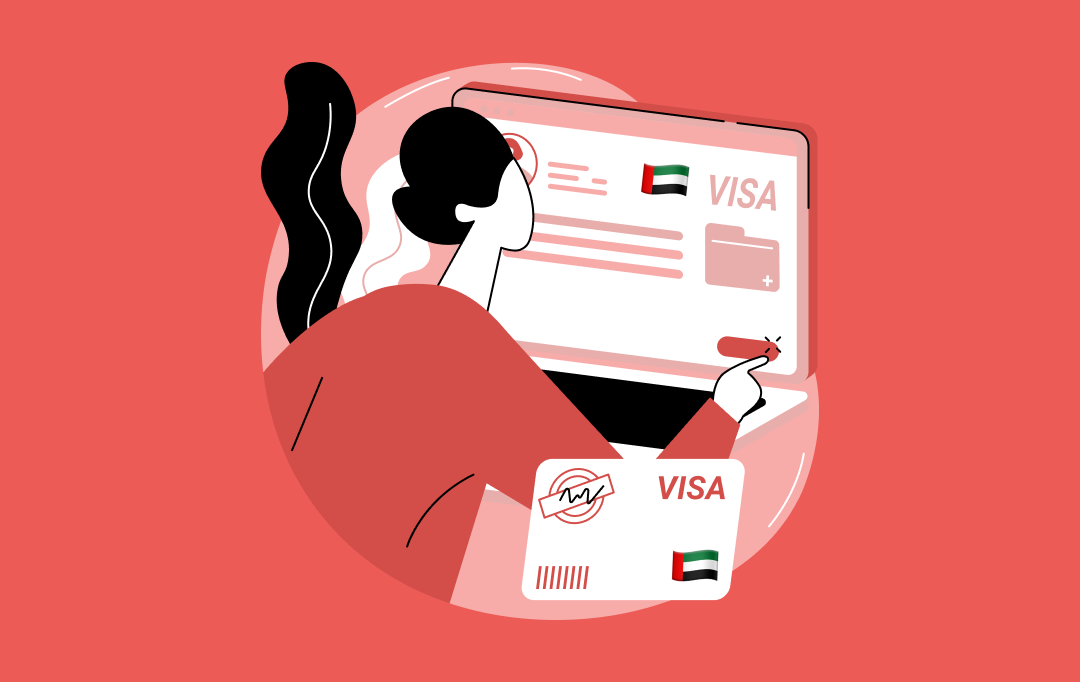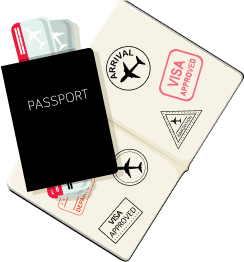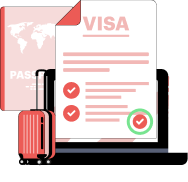- What Challenges Does AI Solve in Traditional Visa Processing Systems?
- What are the Benefits of AI in Visa Processing in UAE?
- Accelerated Processing Times
- Enhanced Accuracy and Consistency
- Strengthened Security Measures
- Real-Time Application Tracking and Transparency
- Cost Efficiency for Government Operations
- Improved User Experience
- Scalability and Adaptability
- How AI is Impacting Visa Processing?
- Biometric Data Integration
- Smart Border Control
- Visa Renewal
- Smart Visa Route System
- AI Interview Simulation
- Visa Approval Calculator
- How Are Countries Around the World Using AI to Reinvent Visa Processing?
- United Arab Emirates
- Australia
- United States
- United Kingdom
- Canada
- New Zealand
- Singapore
- South Korea
- What Challenges Could the UAE Face in Implementing AI for Visa Processing?
- Balancing Innovation with Data Privacy
- Integrating AI with Existing Infrastructure
- Managing Public Perception and Trust
- Ensuring Ethical Use of AI
- Keeping Pace with Rapid Technological Changes
- What is the Future of AI in the UAE's Visa and Immigration Landscape?
- Hyper-personalized visa services
- Predictive analytics for immigration trends:
- Real-time compliance monitoring
- Autonomous decision-making with human oversight
- FAQs
Visa processing is undergoing a quiet but powerful revolution – and the UAE is at its center. In response to a surge in global travel demand, the country has announced new AI in visa processing UAE initiatives to accelerate visa issuance and improve operational efficiency.
As reported by Arabian Business, this transformation aligns with the country’s broader strategy to pioneer digital government services, especially in areas where speed, security, and scale are essential.
The urgency behind this shift to mainstream AI in visa processing in the UAE is clear. Traditional visa processing systems—built on manual data checks, in-person interviews, and time-consuming paperwork—are no longer sufficient to handle the sheer volume of applications from tourists, expatriates, and business travelers.
The UAE alone has witnessed record-breaking travel numbers in the past year, pressuring authorities to find smarter, faster ways to process applications without compromising accuracy or security.
Enter AI visa processing in the UAE. AI is now embedded into every layer of the visa lifecycle, from automating document reviews to simulating interviews and analyzing biometric data. It’s not just about faster turnaround times; it’s about creating a seamless, intelligent ecosystem where human intervention becomes minimal, and decisions are swift and fair.
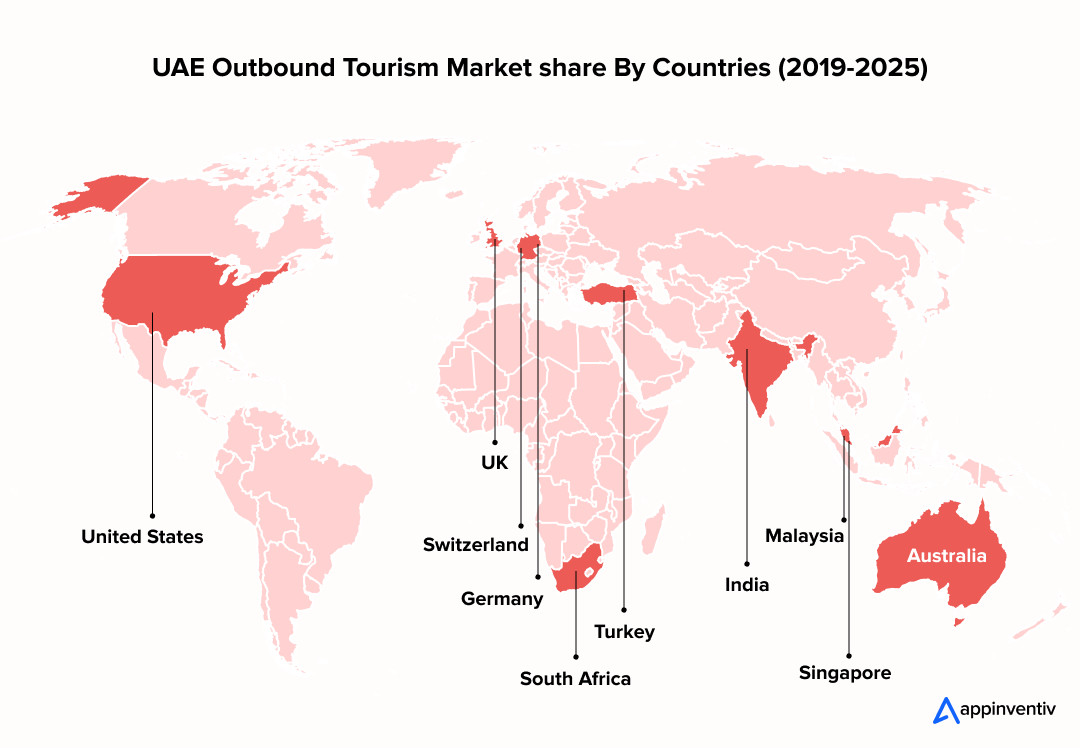
In this article, we explore how AI in MENA visa processing is reshaping the travel experience, from its benefits to its challenges, and what this means for the future of international travel. With the UAE setting the pace, the global landscape of visa processing is about to look very different.
AI will skyrocket the visa market at a 45% CAGR through 2030. Don’t lag—leverage our cutting-edge AI tech solutions to crush the competition.
What Challenges Does AI Solve in Traditional Visa Processing Systems?
For decades, visa processing has been largely reliant on human effort – manual form reviews, physical document verification, and lengthy queues at embassies or visa centers. The traditional model, though structured, was heavily time-bound and prone to inefficiencies. Applicants were required to submit reams of paperwork, wait weeks for updates, and often face inconsistent decision-making influenced by human error or subjectivity.
Before AI-powered visa services in the UAE, the process followed a linear and reactive structure: submit > verify > interview > wait.
Each stage involved siloed systems, often without data-sharing mechanisms between departments or nations. The introduction of online forms or e-Visas didn’t fully address background checks, identity verification, or fraud detection bottlenecks.
The arrival of the AI revolution in the UAE visa process changed that equation.
Today, AI-powered systems are shifting visa processing from a reactive workflow to a proactive, data-driven one.
- Machine learning algorithms for business can now instantly verify documents, flag inconsistencies, and cross-reference applicant data with global security databases in real time.
- Natural language processing tools assist enterprises in screening applications for completeness and accuracy, significantly reducing manual workload. In some countries, AI handles initial decision-making based on predefined policies and risk profiles.
What once took weeks can now be accomplished in hours, or even minutes. Moreover, with biometric integrations and smart routing of applications based on complexity, UAE visa automation has made the process faster, more secure, and scalable.
In the context of artificial intelligence visa in the UAE, these improvements mean the nation can manage high travel volumes, especially during peak seasons, without overwhelming its immigration infrastructure. It also helps support the country’s long-term goals of attracting global talent and streamlining residency pathways through innovative digital experiences.
What are the Benefits of AI in Visa Processing in UAE?
In an era of paramount global mobility, the efficiency and reliability of visa processing systems have become critical indicators of a nation’s openness and technological prowess.
With its strategic vision and commitment to innovation, the country has been at the forefront of integrating AI into visa applications in the UAE and, in fact, in the entire MENA region. This integration offers a multitude of benefits:
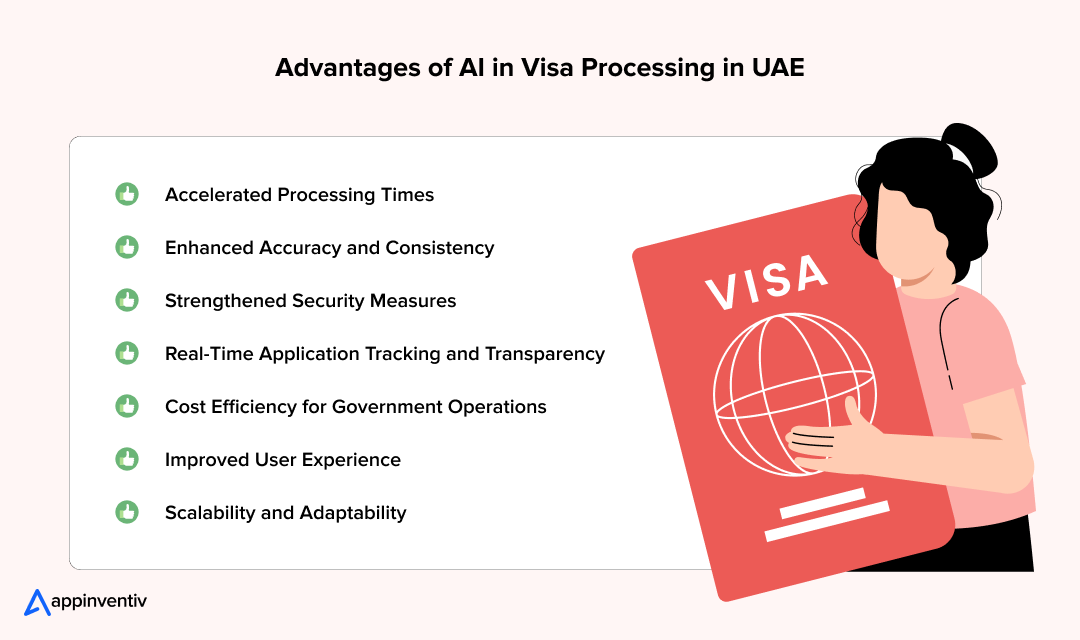
Accelerated Processing Times
Traditional visa processing often involved manual verification of documents, in-person interviews, and extended waiting periods. Automated visa processing in the UAE streamlines these processes by automating data entry, document verification, and background checks.
For instance, AI algorithms can swiftly cross-reference applicant information with global databases, reducing processing times from weeks to hours. This efficiency is particularly beneficial during peak travel seasons or major events, such as the Dubai Expo, where the volume of visa applications surges.
Enhanced Accuracy and Consistency
Human error is an inherent risk in manual processing systems. Dubai AI immigration system mitigates this by evaluating each application against consistent criteria. Machine learning models can detect application anomalies or inconsistencies, flagging them for further review. This enhances the accuracy of the process and ensures fairness and impartiality in decision-making.
Strengthened Security Measures
Security is a paramount concern in visa processing. AI enhances security by integrating biometric data analysis, facial recognition software, and predictive analytics. These technologies can identify potential security threats by analyzing patterns and behaviors that may not be immediately apparent to human reviewers. Visa management software UAE underscores its commitment to maintaining national security while facilitating international travel.
Real-Time Application Tracking and Transparency
AI-powered systems provide applicants with real-time updates on their application status, fostering transparency and reducing uncertainty. This feature enhances the applicant experience by informing them at every process stage. For immigration authorities, it allows for better workload management and resource allocation.
Cost Efficiency for Government Operations
Automating visa processing reduces the need for extensive human resources and physical infrastructure, leading to significant cost savings for government agencies. These savings can be redirected towards other critical areas, such as enhancing border security or improving public services.
Improved User Experience
AI-powered visa services in the UAE tend to facilitate a more user-friendly application process. Chatbots and virtual assistants can guide applicants through the process, answer queries, and provide assistance in multiple languages. This personalized support enhances user satisfaction and reflects the country’s image as a technologically advanced and welcoming destination.
Scalability and Adaptability
AI systems are inherently scalable, capable of handling increasing volumes of applications without compromising efficiency. Given its status as a global hub for tourism, business, and international events, this scalability is crucial for the UAE. The UAE visa processing technology’s adaptability also allows for continuous improvement of the visa processing system, incorporating feedback and evolving to meet changing requirements.
How AI is Impacting Visa Processing?
AI is fundamentally reshaping how countries manage visa-related processes, bringing speed, accuracy, and personalization into systems once known for paperwork and long queues. In its digital transformation efforts, the government has made smart governance a national priority; under this, AI applications in visa and border systems are rapidly advancing, offering a glimpse into the future of travel infrastructure.
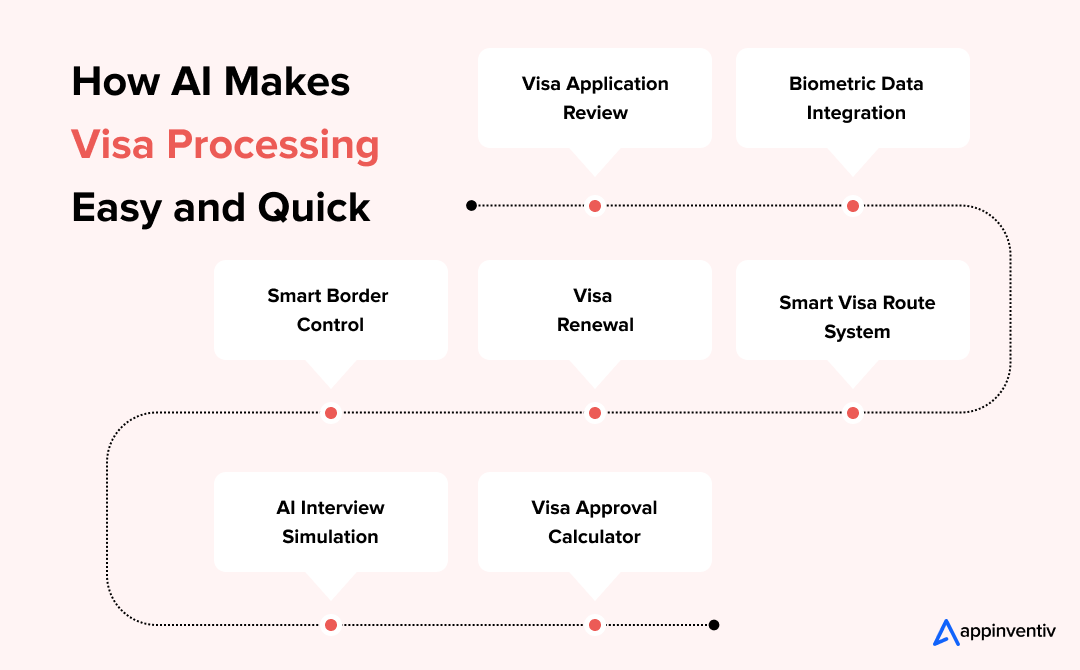 Visa Application Review
Visa Application Review
AI is accelerating visa approvals by automating the most time-consuming parts of the process – document verification, data entry, and eligibility checks. For instance, platforms like Atlys use AI to help users fill out visa forms, verify scanned documents, and detect missing or conflicting data. These capabilities are particularly important in regions like the UAE, which sees high travel volumes year-round.
By reducing manual intervention and eliminating common errors, initiatives like Dubai smart travel AI enable authorities to process thousands of applications faster without compromising accuracy.
Biometric Data Integration
Biometric identification has become a key layer of security in modern travel, and AI is supercharging this shift. Dubai International Airport’s Smart Gates allow travelers to walk through immigration using the facial recognition airport UAE solution, eliminating the need for passport stamping or ID checks.
The AI systems integrated with these gates authenticate travelers in seconds, improving flow and minimizing contact, which is especially relevant post-COVID. The proactive adoption of biometric AI for residency visas in the UAE ensures that identity fraud is drastically reduced while the traveler experience remains seamless.
Smart Border Control
AI is transforming the traditional bottleneck of border security. Companies like Emaratech have developed AI document verification visa UAE solutions like the Smart Corridor, allowing passengers to pass immigration checks without displaying any documents. AI models here analyze a combination of historical travel behavior, biometric data, and watchlists in real time, flagging any anomalies. This system enhances security and helps airports manage increasing footfall with fewer manual checks.
Visa Renewal
Renewing a visa involved multiple visits, paperwork, and long waits. Several Visa renewal automation UAE platforms have emerged, promising to reduce the entire renewal process to a few clicks.
Dubai’s General Directorate of Residency and Foreigners Affairs (GDRFA) introduced the Salama AI platform, which allows online visa renewal in under two minutes. The platform pulls in pre-existing user data, validates it using AI, and submits the renewal request with minimal input from the applicant. It’s a step forward in reducing bureaucracy while maintaining compliance to streamline the UAE travel boom visa demand autonomously.
Smart Visa Route System
Visa approval AI UAE is helping travelers understand and choose the most suitable visa category by analyzing their background, travel purpose, and region-specific rules. Platforms like Tukki’s Visa Match use predictive models to recommend the most appropriate visa path. This is particularly useful for people applying for work, student, or digital nomad visas, where nuances can lead to rejections. Smart routing minimizes misapplications and optimizes processing loads for high-traffic hubs like the UAE.
AI Interview Simulation
AI also transforms applicants’ preparation for visa interviews, especially in high-stakes categories like work or immigration visas. Tools such as Final Round AI simulate embassy-style interviews using natural language processing and facial emotion tracking.
These tools help applicants improve their articulation and body language, boosting confidence and preparedness. In regions like the UAE, where high-skill expats regularly apply for visas, this kind of AI-powered immigration Dubai tech empowers users before they even face a real consular officer.
Visa Approval Calculator
To reduce uncertainty, UAE tourist visa AI approval predictors are helping applicants assess their chances before submitting. Atlys recently launched a Visa Probability Evaluator that examines past approval trends, applicant profiles, and policy updates to offer a success probability score. This tool ensures better preparedness and fewer failed attempts for the UAE, where visa regulations vary across emirates and professions.
Consult our AI pros now and see how our custom solutions can make your vision a reality!
How Are Countries Around the World Using AI to Reinvent Visa Processing?
From visa applications to renewals and border checks, AI is streamlining every stage of the travel process, turning complex, error-prone systems into efficient, intelligent frameworks. For a country like the UAE, which thrives on tourism, international talent, and global business ties, the AI revolution in the UAE visa process is more than just convenience; it’s a strategic necessity.
As AI continues to evolve, its role in visa and immigration processes will only deepen, reshaping how travelers plan, apply, and move across borders with unprecedented ease and trust.
As international travel rebounds and cross-border mobility increases, countries worldwide are reimagining their visa systems with AI-driven solutions. These changes are not just about speed – they aim to balance national security and traveler convenience. From AI-powered eligibility checks to biometric verifications, governments are building more adaptive, predictive, and secure immigration ecosystems.
United Arab Emirates
The UAE AI-driven government services have pioneered smart border control with Smart Gates at Dubai and Abu Dhabi airports. These systems use AI-integrated facial and iris recognition for rapid identity verification. The Salama AI platform Dubai, introduced by GDRFA, enables tourists to renew visas online within minutes, reflecting the country’s push for frictionless travel.
Australia
Australia has led the charge with its Electronic Travel Authority and eVisitor visas, which use automated systems to process short-term visa applications in minutes. In operation at major airports, the Australian Government’s SmartGate system uses facial recognition and ePassport technology to verify travelers without officer interaction. The adoption of biometric facial comparison was further enhanced during the pandemic to reduce physical contact and improve throughput.
United States
The Global Entry Program, managed by U.S. Customs and Border Protection, integrates facial recognition and AI to expedite entry for pre-approved travelers. AI also plays a role in Consular Electronic Application Centers (CEAC) to pre-screen DS-160 visa forms and flag inconsistencies. More recently, the U.S. has tested AI to pre-score visa applications, helping consular officers focus on high-risk or complex cases.
United Kingdom
The UK has extensively incorporated AI and biometrics into its immigration system. Biometric Residence Permits (BRP) combine facial scans, fingerprints, and AI verification to prevent identity fraud. In 2024, the UK Home Office began piloting AI-assisted application triaging to prioritize student and work visa applications based on risk and documentation completeness.
Canada
Canada’s Global Case Management System (GCMS) uses AI to streamline visa and immigration processing. The AI helps identify patterns, assess completeness, and flag application anomalies. In 2023, Canada expanded its use of advanced analytics to triage temporary resident visa applications, increasing overall processing efficiency and reducing backlog.
New Zealand
New Zealand’s NZeTA (New Zealand Electronic Travel Authority) uses AI to automate eligibility decisions for visa-waiver travelers. The tool checks security databases and screens for risk profiles in real time. Facial recognition is also used at airports as part of the SmartGate system, allowing faster, contactless immigration processing.
Singapore
Singapore’s Automated Clearance Initiative (ACI) allows eligible travelers to enter and exit the country using only biometric data, without manual passport stamping. The system uses AI-powered facial recognition and gate-level risk assessment. Immigration & Checkpoints Authority also plans to use AI-driven analytics to predict passenger volumes and optimize resource allocation.
South Korea
South Korea’s K-ETA (Korea Electronic Travel Authorization) relies on AI for pre-approval screening and fraud detection. Travelers can apply online and often receive an authorization decision within hours. The government also uses biometric immigration clearance, such as facial and fingerprint recognition, to reduce wait times and enhance security at Incheon and other major airports.
These advancements show that AI in visa processing in the UAE is no longer experimental; it’s operational, global, and expanding fast. Whether automating approvals, flagging inconsistencies, or enhancing biometric checks, AI redefines how nations manage who enters and exits their borders.
What Challenges Could the UAE Face in Implementing AI for Visa Processing?
As the UAE continues integrating AI into its visa and immigration processes, it encounters unique challenges shaped by its rapid technological advancements and diverse population.
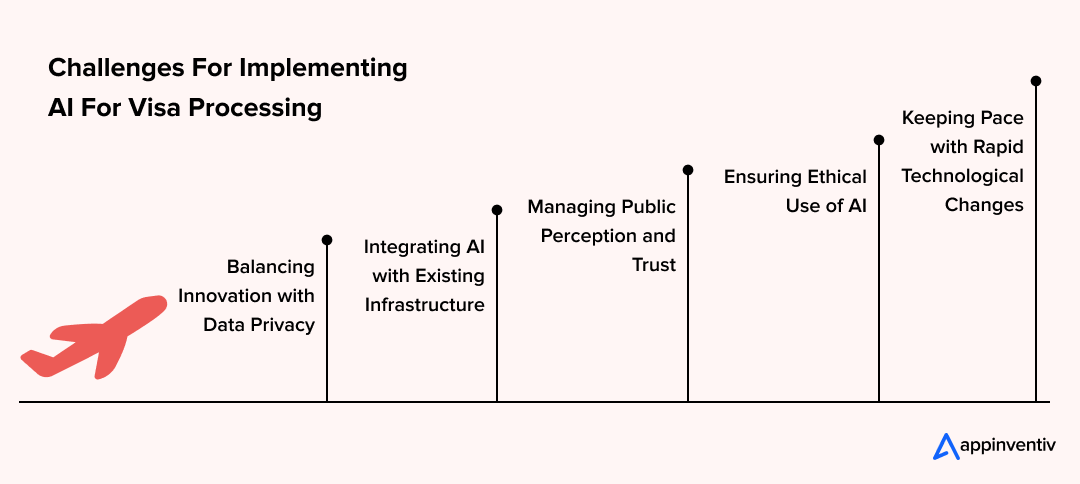
Balancing Innovation with Data Privacy
The ambitious adoption of AI in MENA visa processing technologies, such as facial recognition and biometric data collection at Smart Gates, necessitates stringent data privacy measures. Protecting sensitive personal information is crucial to maintaining public trust and complying with international data protection standards.
Integrating AI with Existing Infrastructure
The UAE’s existing visa processing systems must be seamlessly integrated with new AI-powered visa services for businesses in Dubai. This requires significant investment in infrastructure and training to ensure that AI tools complement and enhance current operations without causing disruptions.
Managing Public Perception and Trust
With a diverse expatriate population, the UAE must address varying comfort levels and trust in AI technologies. Transparent communication about how AI is used in visa processing can help alleviate concerns and foster acceptance among residents and visitors.
Ensuring Ethical Use of AI
The deployment of AI in decision-making processes, such as visa approvals, raises ethical considerations. The UAE must ensure that AI algorithms are free from biases and that decisions can be audited and explained to uphold fairness and accountability. To implement such responsible AI practices at scale, organizations often collaborate with an experienced AI consulting company in Dubai that understands regulatory compliance, ethical AI governance, and public-sector system design.
Keeping Pace with Rapid Technological Changes
The fast-paced evolution of AI technologies means that the UAE must continually update its systems and policies, especially if the nation wants to avoid visa delays with AI-powered processing in the UAE. Staying ahead requires ongoing investment in research and development and collaboration with international AI development services in Dubai and experts to adapt to emerging trends and challenges.
What is the Future of AI in the UAE’s Visa and Immigration Landscape?
As a reliable IT consulting company in Dubai, our market researchers have gathered a pattern of how we see the visa processing domain shifting year over year.
With an extensive effort going towards AI visa processing in the UAE, the nation is positioning itself as a global leader, with significant implications for the future of its visa and immigration systems. This vision aligns with the country’s long-term strategy to diversify its economy beyond oil and establish itself as a hub for technological innovation and smart governance.
A key milestone in this AI in visa processing UAE journey was the launch of Falcon, an open-source large language model developed by the Abu Dhabi government’s Advanced Technology Research Council. When released in 2023, Falcon outperformed models from Google and Meta, boosting the UAE’s reputation as a serious AI contender in the global arena.
The UAE is uniquely positioned to push AI in MENA visa processing frontiers due to its combination of financial muscle, abundant energy resources to power data centers, and business-friendly policies, including tax exemptions. These strengths make it easier for the nation to invest in infrastructure and attract global AI talent.
In the domain of immigration, the future with AI-powered visa services in the UAE is expected to bring:
Hyper-personalized visa services
AI may soon power virtual assistants that customize each traveler’s profile and handle everything from visa eligibility assessments to documentation guidance and travel risk alerts.
Predictive analytics for immigration trends:
The AI revolution in the UAE visa process will likely be used to anticipate visa demand surges, allowing authorities to scale systems in real time and reduce processing bottlenecks during peak seasons.
Real-time compliance monitoring
Future systems could use AI to monitor traveler compliance, such as overstay risks, document expiration, or employment status, and issue alerts or recommendations before violations occur.
Autonomous decision-making with human oversight
As algorithms become more accurate, routine visa approvals could become fully automated, with human officers intervening only for exceptions or flagged cases.
That said, the country knows the ethical and societal considerations around the Artificial Intelligence visa in the UAE ecosystem. Concerns such as transparency, data privacy, and potential bias in algorithmic decisions are at the top of regulators’ and policymakers’ minds.
Although some researchers express hesitations about civil liberties and internet freedom, UAE officials maintain that access to funding, data, and computational power offsets those concerns and makes the country an appealing destination for ambitious AI work. To ensure this alignment, partner with a software development company in Dubai that is well-versed with all the complications and their workarounds.
With AI firmly embedded in its national priorities, the UAE is not just adapting to global trends in digital immigration – it’s actively shaping the future of borderless mobility.
FAQs
Q. Where can I find AI-powered visa automation services in the UAE?
A. Both government-backed and private platforms increasingly offer AI-powered visa automation services. Dubai’s General Directorate of Residency and Foreigners Affairs (GDRFA) has begun integrating AI into smart gates and e-visa systems. For businesses, solutions like the Salama AI platform Dubai, G42, and Tahaluf provide intelligent automation tools that can be integrated into HR or immigration workflows.
Q. How can AI visa processing in the UAE improve company employee onboarding?
A. UAE visa automation streamlines document verification, eligibility screening, and biometric checks, cutting down onboarding timelines by automating repetitive tasks. For example, using AI-powered onboarding platforms integrated with visa systems, companies in free zones like DIFC or DMCC can reduce wait times from weeks to days, allowing new hires to begin work sooner.
Q. How to implement AI visa management for multinational companies in Dubai?
A. Large businesses can adopt centralized platforms that connect their HR systems with Dubai government portals via APIs. Vendors like Oracle, SAP, or G42 offer configurable AI visa application solutions in the UAE that can handle visa tracking, renewal alerts, and compliance reporting across regions. Integration support is also available through Dubai’s Smart Government Services and Digital Dubai initiatives.
Q. What is the Salama AI platform, and how does it demonstrate the capabilities of AI in visa processing in the UAE?
A. Salama AI platform Dubai is part of the city’s broader push toward AI-enhanced governance. Though originally built to support digital health records, its machine learning and data analytics capabilities are now being extended to support smart government workflows, including immigration and visa services. It aids in predictive screening, fraud detection, and real-time eligibility checks.
Q. How does AI enhance compliance with UAE visa regulations?
A. AI can monitor visa expiry dates, track overstay risks, and issue automated compliance alerts to HR departments. This is especially useful for companies hiring large volumes of expatriates. Dubai AI immigration system algorithms can also be designed to flag discrepancies in documentation or violations of work permit terms, helping avoid fines or blacklisting.
Q. How is AI transforming the visa application process in Dubai?
A. AI is making Dubai’s visa process faster, more accurate, and user-friendly, from chatbots guiding applicants through online forms to biometric validation and intelligent document scanning. The Smart Dubai initiative integrates automated visa processing in the UAE solutions into the DubaiNow app and GDRFA portal, reducing human error and eliminating unnecessary in-person visits.
Q. How can Dubai businesses benefit from AI-driven visa automation?
A. Companies benefit through faster turnaround times, fewer manual errors, real-time compliance tracking, and reduced administrative costs. AI-powered immigration Dubai can also provide data insights, such as hiring trends and nationality-based approval patterns, helping businesses optimize their recruitment strategies.
Q. What is the role of machine learning in automating UAE visa approvals?
A. Machine learning models analyze historical visa application data to predict approval outcomes, detect patterns in fraudulent documents, and assign risk scores to applications. Over time, these UAE visa processing technology models help the government increase approval speed while tightening security through predictive insights.
Q. How can businesses integrate AI visa application software into their HR systems?
A. AI integration for residency visas in the UAE is possible through middleware platforms or APIs provided by government portals or third-party vendors. Many enterprise software providers, such as SAP SuccessFactors, Zoho People, and Oracle HCM Cloud, offer plug-ins or partnerships with AI-enabled visa management tools for seamless workflows and regulatory reporting.


- In just 2 mins you will get a response
- Your idea is 100% protected by our Non Disclosure Agreement.
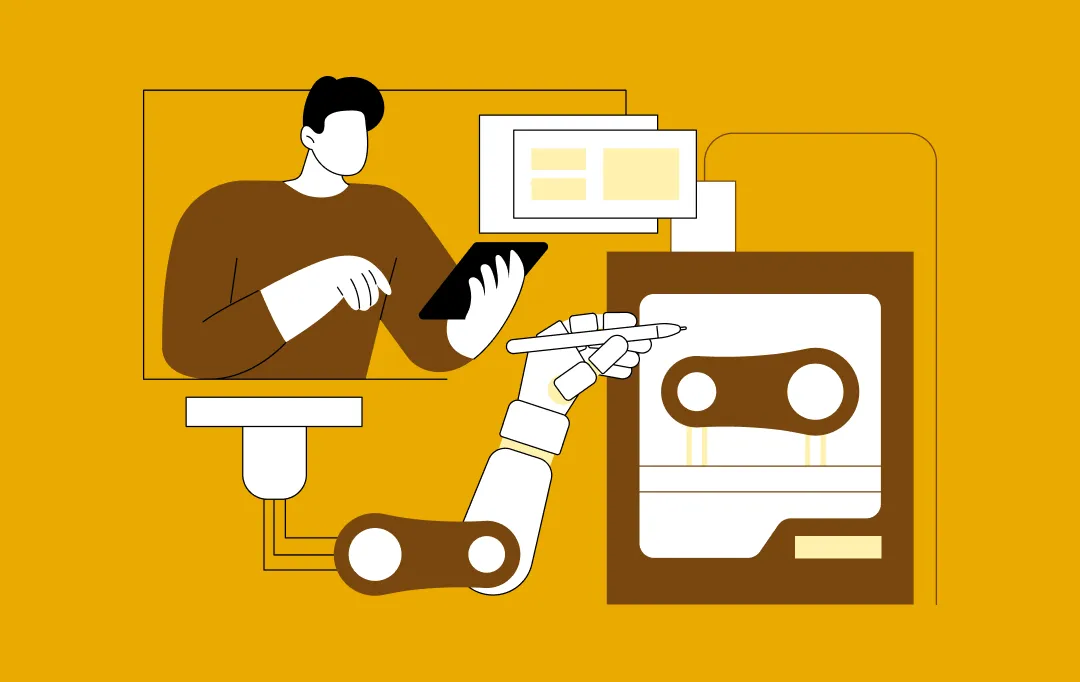
Governance vs. Speed: Designing a Scalable RPA CoE for Enterprise Automation
Key takeaways: Enterprise RPA fails at scale due to operating model gaps, not automation technology limitations. A federated RPA CoE balances delivery speed with governance, avoiding bottlenecks and audit exposure. Governance embedded into execution enables faster automation without introducing enterprise risk. Scalable RPA requires clear ownership, defined escalation paths, and production-grade operational controls. Measuring RPA…
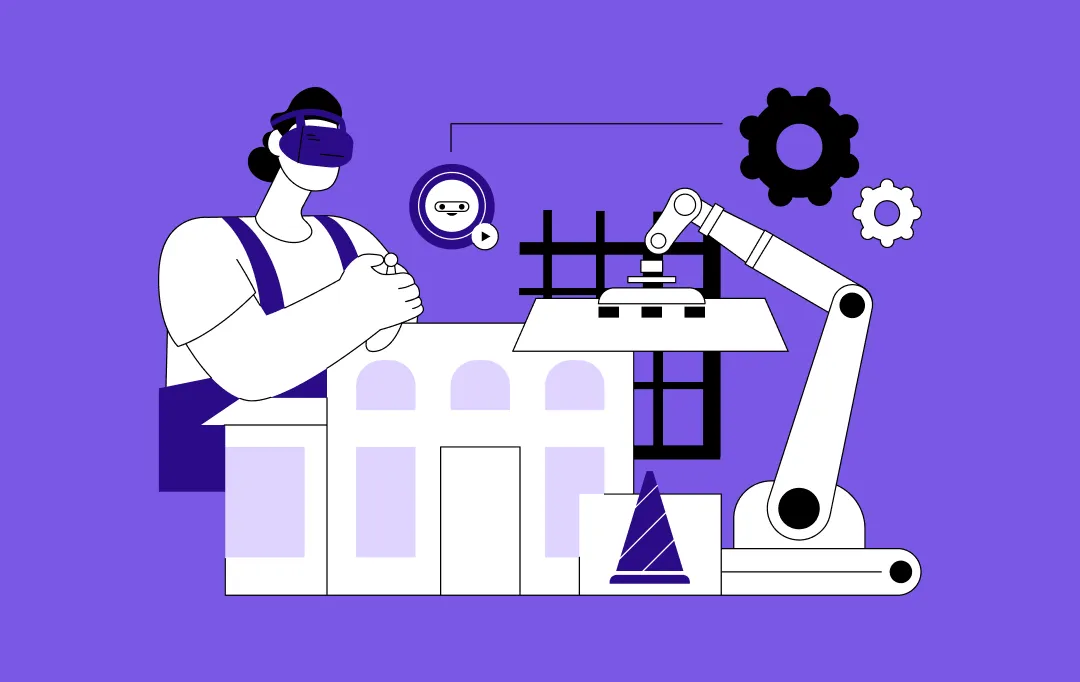
How AI Overhauling Industrial Automation in Australia
Key takeaways: AI is shifting industrial automation from rule-based to data-driven decision ecosystems Predictive and autonomous operations are improving efficiency and cost optimisation Australian industries are leveraging AI to solve workforce, sustainability, and compliance challenges Enterprises adopting AI early gain competitive, operational, and economic advantages Industrial automation in Australia is no longer just an engineering…
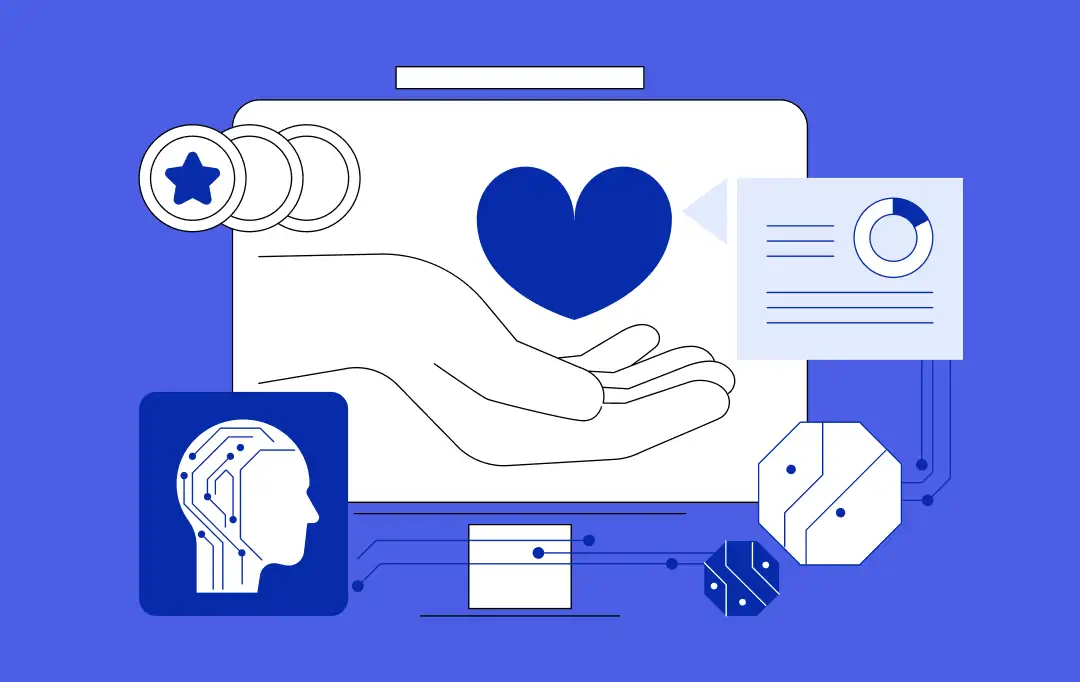
Implementing Retrieval-Augmented Generation in Healthcare Systems: Challenges, Use Cases & ROI
Key takeaways: RAG helps clinicians make better decisions by connecting AI responses to trusted clinical data sources. Healthcare organizations are gradually adopting domain-specific AI to improve efficiency, compliance, and operational clarity. Successful RAG deployment usually depends on strong governance, interoperability planning, and secure data practices. Retrieval-backed AI can ease documentation workload while improving accuracy, productivity,…


























